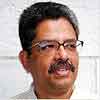Education is intriguing, but not precise. Like watching a Woody Allen movie with subtitles from a Quentin Tarantino film.
A child preparing for a school exam the other day thought he’d save time and energy by simply asking me some questions. And I was pleased, as anyone would be who thought that children still believed adults had all the answers. “What is Archimedes’ Principle?”, he asked, and I realised all of a sudden that my education had consisted of a series of unconnected images that had little to do with actual answers. Or perhaps, as I approach Archimedes’s age, I retain only the more interesting parts of my education.
I know, for example, that Archimedes was running naked through the city screaming “Eureka” when a soldier cut off his head because he was being needlessly hypotenuse. Or was that Pythagoras who told his parents he could not tell a lie after chopping down the cherry tree? “I thought it was an apple tree,” he said, hoping that some day sitting under just such a tree a scientist would attain enlightenment, and say at the age of 32 that he had no more worlds to conquer.
No, that last was definitely Peter the Great, unless it was Alexander the Great, easily confused because both had the same last name. Frederick, Alfred, Ivan had the same surnames too, but I don’t think they were related unlike the Russian movie director Sergei Eisenstein and the German physicist who had a similar name.
I have a vague memory Archimedes said that when a body is immersed in water, the telephone rings, but that could easily have been Alexander Graham Bell who invented the lunch gong (unless it was Edison, best known for inventing New Jersey). Education, in the immortal words of Bertie Wooster, is not a process of putting in; it is a taking out. Or was that Socrates who said that, soon after scoring his 100th goal for Brazil and just before sipping the diet hemlock that had sponsored him?
So many years removed from my school, it is difficult to separate the wheat from that other thing. Some abstract concepts remain, but mostly what education has done is to project onto the screens of the mind a series of television images which occasionally run into one another. The subtitles, to add to the mystery, are often mixed up too, so it is like watching a Woody Allen movie with subtitles taken from a Quentin Tarantino film. Intriguing, but not precise.
That could be a pithy summing up of my education – intriguing, but not precise. Facts are swirling about inside my head, and the chances of the right one responding to a specific question are about the same as the odds on finding a solution to Fermat’s Last Theorem. Or now that someone has actually done that, proving the Reimann Hypothesis. I have no idea what the Reimann Hypothesis is or indeed if he was old enough to hypothesise, but I remember a delightful story concerning the mathematician G H Hardy and Reimann.
Before he set out on a journey, especially one involving a ship, he sent off cards to friends with the simple message: “I have proved the Reimann Hypothesis.” His argument was that god (who he did not believe existed) would be so piqued by this, he would keep Hardy safe from harm till the journey was over just so he could share his proof with the world. Or something like that. It might have been a story of Henry V at Caesar’s funeral.
The problem with education is not that it fills your head with all kinds of information, but that if you don’t keep refreshing it you struggle to tell a youngster what Archimedes’ Principle is. One way nature helps is by ensuring you have to teach your children. Thus, till my son was seven or eight, he couldn’t have asked for a better tutor than his dad. And then they introduced long division in the curriculum, and I was lost.
The advantage Archimedes had was that he didn’t have to learn about Newton or Einstein or Peter the Great in school. He had a lot of time on his hands, which he used profitably by working out his principle. And there was a bathtub which made everything easier. But don’t ask me how.
